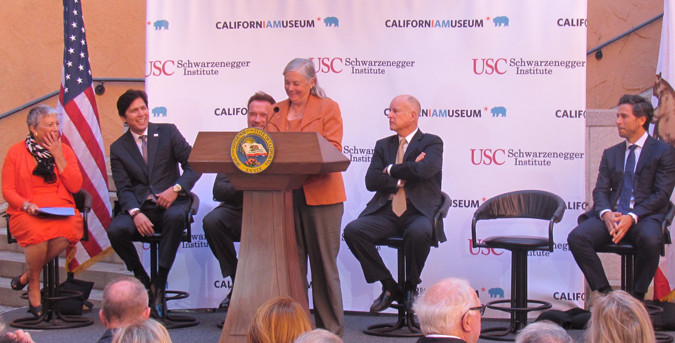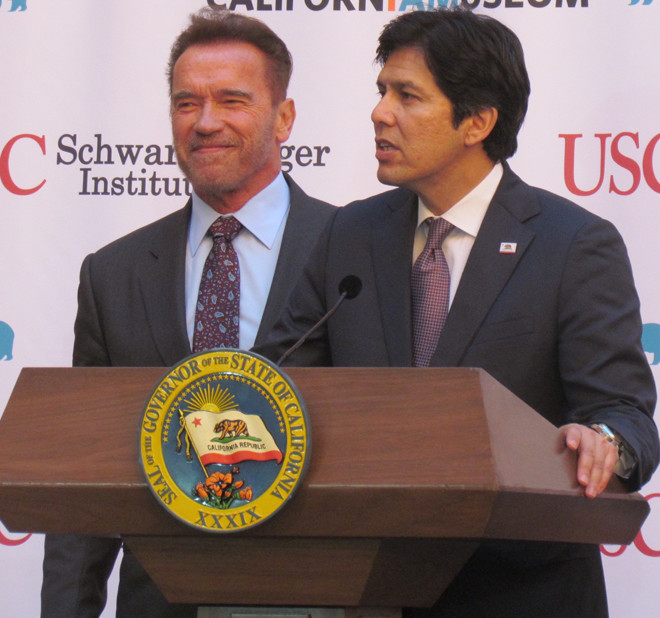
The USC Schwarzenegger Institute held a small congratulatory celebration of the tenth anniversary of A.B. 32, the California Global Warming Solutions Act, at the California Museum in Sacramento today.
A roster of luminaries who participated in the state's efforts to pass climate change law honored California leadership in rising above politics as usual to win not only “the most powerful environmental law ever”—according to former Governor Arnold Schwarzenegger—but a state economy that is strong and growing.

“The California GDP is more than double the national GDP,” said Schwarzenegger, who signed the law, “and I hope the rest of the world gets that message.”
Senate President Pro Tem Kevin de León also touted the economic benefits of the various climate change regulations now in place, not only A.B. 32, which set the original greenhouse gas reduction targets, but other laws requiring statewide energy efficiency and investments in disadvantaged communities. “The California clean economy employs more than 500,000 people,” he said, and as of this morning California is officially the 5th largest economy in the world. “We have created more jobs than the other top two job creators in the U.S., Florida and Texas, combined,” he said.
Senator Fran Pavely, the author of A.B. 32 as well as the recently passed S.B. 32,which extends the greenhouse gas reduction goals of the original, talked about how difficult every step of California's climate change fight has been. Early opponents said it made no sense for California to pass emission regulations because it could not do it alone. But now, said Pavely, “with California policy married to national emissions policies, we have cleaner air, we're saving money, and we have more choices” of transportation and energy sources than we did ten years ago.
De León and Pavely awarded a certificate of appreciation to former House Speaker Fabian Núñez, who led the efforts to get support in the legislature for A.B. 32. “Fabian Núñez broke the mold for what it means to be an environmentalist,” said de Leon, pointing out that Núñez's original focus was on helping his community, until he realized that the climate change goals were a necessary part of that fight.
Schwarzenegger honored Air Resources Board chair Mary Nichols for her support, saying “it is one thing to pass legislation, and another to follow through.”
He described some of the fights they faced together ten years ago, including trying to get the federal government to allow California to regulate greenhouse gas emissions. It took the Supreme Court, said Schwarzenegger, to declare that GHGs were, indeed, a pollutant and could be regulated. “Duh!' said Schwarzenegger. “I could have told them that!”
He invited Washington politicians to visit California and learn how things can be done. “You will be jealous,” he said. “But if the rest of the country was as energy efficient as California is we could close 75 percent of the coal-fired plants” in the U.S.
Governor Jerry Brown pointed out that even though it did take a lot of hard work to get where we are now, there was a certain amount of luck involved as well. For example, he said, the Supreme Court vote cited by Schwarzenegger was won by a single vote, from conservative justice Anthony Kennedy.
He thanked Kennedy, then expressed appreciation for California Republicans of the past such as former Governor Ronald Reagan—who signed the act that created the Air Resources Board, because, said Brown, “even Republicans hated the smog in L.A.”
Schwarzenegger, a Republican governor, supports cap and trade, said Brown. “You can't get a Republican to support cap and trade now, even though it's a Republican idea!”
“Climate change is not the stuff of politics,” said Brown. “It is much broader, more global, and longer term.” California can't do it alone, but it isn't any more. According to Brown, 130 states, regions, and provinces have signed on to California's Memorandum of Understanding on climate change in the ten years since A.B. 32 was signed.





